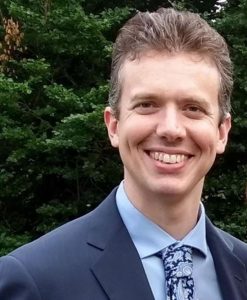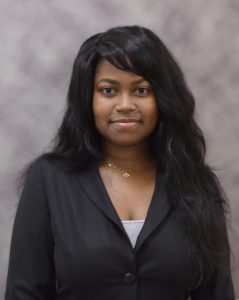Mastering research: These VCU conference presenters are grad students, but not Ph.D.s
For John Gyourko, it was an opportunity to realize an envisioned project and help at-risk children in foster care. For Nicole George, it was a chance to change perceptions and make a difference in the learning environment of Spanish-speaking elementary school children.
In both cases, their experiences outside a VCU classroom led the two social work master’s students to pursue research projects that ultimately have them headed to Washington, D.C., to participate in the 24th Society for Social Work and Research Conference on Jan. 16-19, 2020.
While it’s common for doctoral students or postdoctoral researchers to present along with faculty at major conferences, it’s more rare to have master’s level students participating. In fact, five VCU social work Ph.D. candidates, one first-year Ph.D. student and one postdoc are part of 12 separate presentations.
But this year’s conference will feature not only Gyourko and George but also Amelia Kirby, who graduated with her master of social work degree in May 2019. Melissa Stewart, Ph.D., the M.S.W. program director and a social work associate professor, says research is a staple of the master’s program.
“While it is uncommon for M.S.W. students to present at national conferences, it is not uncommon for M.S.W. students to conduct research,” she says. “All M.S.W. students at VCU are required to complete independent research projects during their specialization year in the M.S.W. program. M.S.W. students are well trained in research and conduct important and relevant applied research based upon their experiences in their field placement. John and Nicole are working with VCU faculty to contribute to the knowledge base in their respective areas of interest and in ways that directly benefit clients.”
Gyourko, a part-time student who works as a foster care program specialist within the Virginia Department of Social Services, collaborated with social work assistant professor Jamie Cage, Ph.D., on a project titled “Credit Checks for Youth in Foster Care: Detecting, Addressing, and Preventing Child Identity Theft.” The ePoster presentation is set for 8 a.m. Jan. 17.
George, a full-time student, is also making an ePoster presentation, “Navigation Skills of Spanish Speaking Children with a Monolingual English Teacher and Engagement,” at 9:45 a.m. Jan. 19. Kirby is presenting with social work assistant professor Nicole Corley, Ph.D., on “M/Othering While Black: A Content Analysis of Black Mothers in Social Work Journals,” one of three presentations within a gender-focused session at 3:45 p.m. Jan. 17.
‘This is a vulnerable population … (and) economically precarious’
Gyourko discovered that while federal law mandates credit monitoring for youth in foster care, there is limited research on the subject.

“I realized I had stumbled onto a genuine gap in the literature,” he says. “It was sort of surprising that most regions were not tracking identity theft within foster care systems. Consequently, we’re not really sure about prevalence rates at the national or regional levels. That’s really the goal of this project – to help clarify how often this happens and who is affected.”
His study, which analyzed credit checks conducted for 5,006 youth in Virginia’s foster care system during a 45-month review period, found that 7.21 percent of the youth had some type of financial activity or irregularity in their records.
“We can’t say with certainty that the discrepancies we observed were actually the result of identity theft, and it’s beyond the scope of the project to investigate the causes,” he says. “But what we do know is that any financial activity or errors linked to a child’s identity are potentially problematic. With very few exceptions, children shouldn’t have any credit history.
“This is a vulnerable population, especially as kids transition out of the system. Often they’re having to navigate economically precarious transitions to adulthood at far younger ages and with less support than other groups. It’s important that they exit care with clean credit records – not only to reduce risks during emerging adulthood, but also to support their longer-term financial well-being.”
Gyourko says while identity theft is an issue for all children, there is some debate about the relative vulnerability of different groups. Compared to children in the general population, Gyourko notes, identity theft may be less prevalent among children in his study’s sample, likely because of protections in place through the foster care system. But it’s difficult to say for sure, as data are scarce and reporting is not standardized.
Two of the largest-scale studies cited in Gyourko’s research are a 2011 report by Carnegie Mellon University and a 2012 report by identity protection firm AllClear ID. These sources found that 10.2 percent and 10.7 percent, respectively, of children in the general population had potentially fraudulent activities linked to their identities.
“Most parents I know aren’t regularly monitoring their children’s credit, so unless there’s a glaring problem, identity theft can remain undetected for years,” Gyourko says. “Foster care credit check programs are designed to prevent that.”
He says he hopes his project contributes to the evidence base informing prevention and remediation practices. “There’s not a whole lot of empirical evidence to guide remediation. Given the complexities involved, the action steps and total time needed to resolve discrepancies can vary from case to case.
“Because the current federal policy is one check per youth per year, it can be difficult to gauge the effectiveness of remediation efforts. We drew some policy implications from our findings, one of which is that additional checks may help guide practice and ultimately enhance protections for youth in care.”
‘Students … left to navigate the classroom on their own’
George’s work originated at Trinity College in Connecticut, where she earned a bachelor of science in psychology and education studies, with a minor in law/legal studies. Working with a teacher at a Hartford-area elementary school as part of an education class, she noticed the struggles of Spanish-speaking fifth-graders to comprehend and participate in classwork. She returned to the school for more intensive observation for her senior research thesis, focusing on about five children out of a class of 30.

“My findings revealed that the students who had no English comprehension were kind of left to navigate the classroom on their own,” she says. “They tended to utilize other students, other Spanish-speaking students who did have comprehension or could explain – in a way they could understand in their native language – what’s going on in class, what are the instructions the teacher just said, what page are we on.”
But, George says, the students trying to assist their peers would often get frustrated themselves or called out for bad behavior when they were trying to help.
“They’re not only students, but they’re also acting in a role like educators, making sure they’re on task and the other students are on task. Even the nicest kids can become tired of having to do this every single time. Sometimes they would get in trouble, as the teacher perceived they were speaking during class time, when, in reality, they were just trying to help.”
George hopes her study helps alleviate such misperceptions of bad behavior among non-English speakers.
“There is a strong reputation for these students as being inattentive or disruptive in class, but they don’t understand and don’t always have the services to support them in the classroom. You don’t want to build the stigma of students being disruptive or not trying to learn. If students can’t understand, more than likely, their parents don’t understand the comments teachers are sending home and don’t have the resources to reach out and say, ‘how can I support my child?’
“When students did receive help, they were smiling and raising their hands and asking questions. For those who did have an ESL (English as a Second Language) class in the morning, they were excited to go and really happy about that.”
Benefiting from the research experience, faculty mentoring
Both Gyourko and George say they see the conference opportunity as a possible first step on a path to pursuing a career in academia.
“The project has informed the direction I want to take as an aspiring doctoral student. I look at it as a first step, a descriptive study,” Gyourko says. “There’s also a larger opportunity to build this evidence base, which I think ultimately benefits children and families in meaningful ways. I’m grateful that my experience at VCU has centered in part around this work.”
George says, “I would love to go into academia and teach students about refugee and immigrant populations and how we can support them as social workers. This project made me realize I wanted to get an M.S.W. I need to be an advocate, I need to go into this field.”
Both said faculty assistance was critical to their projects’ success.
“This is really beyond what I was trained to do – longer term, larger scale,” Gyourko says. “I first approached Dr. Cage because I thought my project fit with her research interests. It turned out she was available and interested in the work, so we started collaborating. It’s been a wonderfully productive and very valuable learning experience for me.
“Before this project, I didn’t have much experience with data cleaning, navigating IRB (Institutional Review Board) requirements, or synthesizing policy implications from study results. Dr. Cage helped me understand that and brought me along, showing me the process required to conduct a rigorous evaluation. Her mentorship has been key.”
George relied on social work associate professor Hyojin Im, Ph.D., to help her navigate the conference submission process and to provide feedback on her presentation.
“I never thought I’d be selected,” George says. “She helped me feel a lot better. As a master’s student, with mostly doctoral students presenting, I feel like I’m kind of at the lower end. But I feel proud of my work because it was accepted. But just a lot of nerves.”
A faculty colleague, Karen Chartier, Ph.D., says Cage’s and Im’s support represents the natural arc, one-time students who were mentored and now are positioned to help subsequent generations of students.
“I have described on many occasions how lucky I was to be supported by strong mentors, both during my doctoral program and in the years after,” says Chartier, a social work associate professor who is a part of three SSWR presentations, including one with two VCU Ph.D. candidates. “As a faculty member, I think it is important to do what you can to pass that experience forward.”
Other student presenters
- Leah Bouchard, Ph.D. student (two presentations)
- Tommy Buckley, Ph.D. candidate (one presentation)
- David Conley, Ph.D. candidate (one presentation)
- Gabriela Jiskrova, postdoctoral fellow (three presentations)
- Claire Luce, Ph.D. candidate (three presentations)
- Laura Swan, Ph.D. candidate (three presentations)
- Keith J. Watts, Ph.D. candidate (one presentation)
View a complete list of VCU School of Social Work presentations at SSWR 2020.
Categories Faculty and staff, Research, Students
